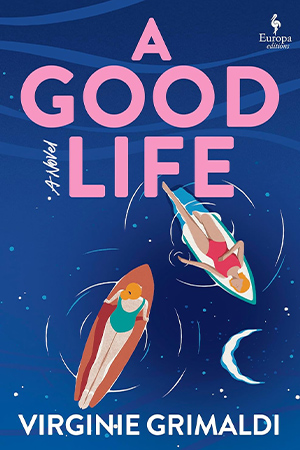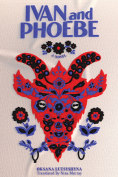A Good Life by Virginie Grimaldi
 New York. Europa Editions. 2024. 288 pages.
New York. Europa Editions. 2024. 288 pages.
Your sister knows you from before you have mastered the art of performance. That makes her dangerous, for she alone has seen you at your most exposed moments of shame, humiliation, and vulnerability. Acclaimed French novelist Virginie Grimaldi has an almost guttural sense for the sometimes-toxic closeness sisters experience growing up with one another.
In A Good Life, Grimaldi chronicles the lives of two sisters over many decades by presenting us with both their first-person voices, which appear on separate pages and flip back and forth in time. The older one, Emma, disappeared from the younger sister, Agathe’s, life five years ago and now has asked her to join her for a week at their grandmother’s house in the Basque country. Their beloved grandmother has recently passed, and Emma seems to want to make amends with her sister, who has been devastated since she deserted her. Emma felt she was suffocating in their relationship and had to break ties completely, but the scars left on Agathe are felt throughout the narrative. On her way to meet her sister, Emma has second thoughts: “I’d have liked it not to be there. For us to leave, unable to enter, forced to give up. I’d have liked never to have suggested to my sister that we come to spend our last vacation here, like when we were little, before the house belongs to others. I’d have liked never to know the feeling of this door opening without our grandmother’s voice asking us to take off our shoes.”
Grimaldi has been accused by some critics as writing with an unbearable lightness, and she sometimes gets a bit breezy here too, but her narrative voice is never fraudulent, and achieves razor sharpness in capturing each sister’s essence. Their father died when they were both young, and their mother was emotionally absent and abusive to them. The girls leaned on each other, particularly the younger Agathe, who was exquisitely sensitive and prone to psychological ravages that Emma was spared. Still, there were joyous episodes they both remember. They fell in love with the Titanic movie, which they watched repeatedly, discussing Jack and Rose’s love affair and whether Jack could have fit on Rose’s raft as Agathe believed he could.
Agathe works as a caretaker at a nursing home where she thrives on the neediness of the patients who adore her attentiveness. Emma is married, a mother of two, and works as a schoolteacher. Agathe has many boyfriends, but they never seem to last long. Agathe grasps that being born second put her at a disadvantage. She entered occupied territory, and an unhappy home. Emma confesses in one of her meditations how her first memory of Agathe being born in 1985 when she was five was traumatizing. Grimaldi describes Emma’s first reaction: “My sister was born this morning. She’s ugly. . . . I don’t want her. I hope they are going to leave her at the hospital.” But she is also interested in this strange new being who comes with an adorable teddy bear she can’t wait to get her hands on. It isn’t long before they are inseparable.
Emma has spent five years out of contact with Agathe, and when they first meet, Agathe feels like she has lost the “rhythm of our banter.” The two sisters go to the beach, watch old movies of themselves chasing each other, and go dancing in a club where Emma seems on the verge of saying something consequential but never gets around to it. There are moments of tension when ancient grudges surface but also love and laughter while recalling the deliciousness of their grandmother’s ravioli, farfalle with zucchini, and orange cake. Emma notices a joyfulness in Agathe she recalls from their earliest years and thinks to herself how “she was always better than me at catching happiness as it’s flying past.”
Grimaldi shies away from bold proclamations or grand finales. She sees life as an extended dialogue of sorts, with others and with ourselves. She isn’t too concerned about right and wrong, seeing both terms as limiting and beside the point. So, what is the point then? In Grimaldi’s universe, it seems to be about the difficulties and messiness of love and what we must be willing to do to keep it forever.
Elaine Margolin
Merrick, New York






























